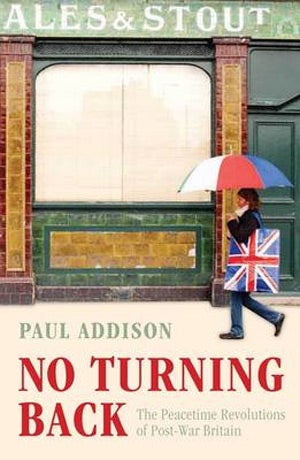No Turning Back, By Paul Addison
How domestic appliances helped turn peacetime Britain into a perpetually revolutionary state

Your support helps us to tell the story
From reproductive rights to climate change to Big Tech, The Independent is on the ground when the story is developing. Whether it's investigating the financials of Elon Musk's pro-Trump PAC or producing our latest documentary, 'The A Word', which shines a light on the American women fighting for reproductive rights, we know how important it is to parse out the facts from the messaging.
At such a critical moment in US history, we need reporters on the ground. Your donation allows us to keep sending journalists to speak to both sides of the story.
The Independent is trusted by Americans across the entire political spectrum. And unlike many other quality news outlets, we choose not to lock Americans out of our reporting and analysis with paywalls. We believe quality journalism should be available to everyone, paid for by those who can afford it.
Your support makes all the difference.There's no faulting the timing. Just as our two-party system is thrown into turmoil with a three-party election result, Paul Addison is on hand with the news that there's no need for panic. Britain, he argues in this near-panoptic account of the half-century that took us from Attlee to Blair, has lived through one revolution after another during those years. Though his book went to press long before our most recent travails, Addison would let us be in no doubt that we ought to be able to handle whatever is next thrown at us.
Earlier historians of our recent body politic took it as a given that what changed the country in the 20th century was the double shock of the two world wars. With the advantage of a longer view, Addison sees things rather differently. What did for tradition, he argues, wasn't the wars themselves but the peace and – eventually – the prosperity they ushered in. In just a couple of generations, we went from being a nation of constructors fed on meat and two veg to being a nation of consumers in which, "The combined turnover of the coal, steel, and shipbuilding industries was less than that of the 10,000 Indian restaurants in Britain."
For all that, Addison is adamant that what his subtitle calls "The Peacetime Revolutions of Post-War Britain" began earlier than we think. The 1950s of cliché is a decade of moral conformity in which men went out to work, women stayed at home with their children and chores, and everyone knew their place – largely because they knew everyone else's. There is, Addison points out, some truth to this romanticised vision in which the hard-working housewife was "the cornerstone of the system". More by accident than design, though, the cornerstone was being chipped away. The boom in sales of domestic appliances and convenience food that could be heard ever more loudly as the decade wore on was the beginning of the end of the idea of the stay-at-home wife. Far more than feminism, it was fridges and washing machines that freed women from the ties of home and paved the way for Harold Wilson's talk of the "white heat" of the scientific revolution.
The other great liberator of the 1950s was full employment. The post-war Keynesian settlement had ensured that pretty much everyone who wanted a job had one. Which meant that the boot was firmly on the foot of the worker. If they didn't like what the boss was saying to them, they could always move on to another one. In practice, instances of workplace insurrection were few and far between (the truculent charms of Alan Sillitoe's Arthur Seaton and Peter Sellers' Fred Kite were charming only because they were fictional). But rebellion was the beating heart of the decade's most crucial cultural invention: the "pleasure-seeking, product- hungry... aggressively sexual" teenager.
Yet, if it was a fantasy vision of the 1950s that motored the Thatcherite destruction of the post-war settlement (for my money, the only genuine revolution we have lived through in the period Addison covers), it was the reality of the 1950s' futuristic avarice that her governments ended up taking us to.
Far from setting the clock back – as Mrs Thatcher, following Evelyn Waugh, believed it was the Conservative Party's duty to do – she and her minions unwittingly dragged us into the spiritual wasteland of our perpetual present. For all her rhetoric about Victorian values, her price-of-everything, value-of-nothing philosophy succeeded only in rendering hitherto weighty moral dilemmas into merely so many lifestyle choices. During her watch, divorce rocketed, pornography burgeoned, the church withered, and homosexuality became just one among several accepted norms. Whatever else Mrs Thatcher's revolution was, it wasn't the one she thought it would be.
No matter, says Addison, who, though he might confess to finding the new Britain an occasionally disorienting place, wouldn't like to go back to the one he grew up in. Thanks to the efforts of Andrew Marr, Dominic Sandbrook and Brian Harrison (to name just a few of the recent historians of post-war Britain), his story is hardly groundbreaking. Still, few of the pages of No Turning Back go by without an eye-opening factoid to enlighten, or a hitherto-unheard anecdote to amuse, and more than once in an otherwise broadly chronological narrative our guide pops up to append a personal note to an otherwise familiar tale.
My only complaint is that Addison has rather too little to say about popular culture. Nobody wants another semiotic takedown of Hammer Horror, but surely the great revolution of the past half-century has been the one that has taken us from being a country in which entertainment was something active and participatory to one in which it is passive and atomised. Post-war Britain: from pub piano to personal stereo, discuss...
Join our commenting forum
Join thought-provoking conversations, follow other Independent readers and see their replies
Comments